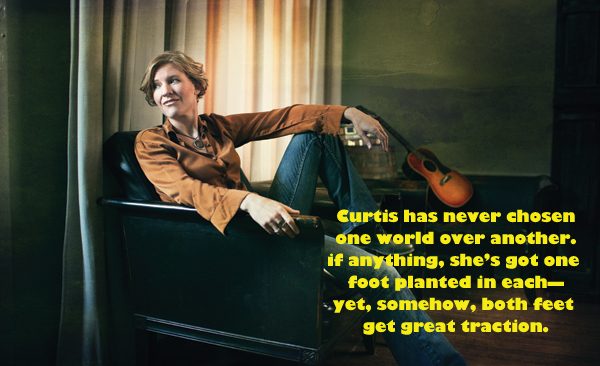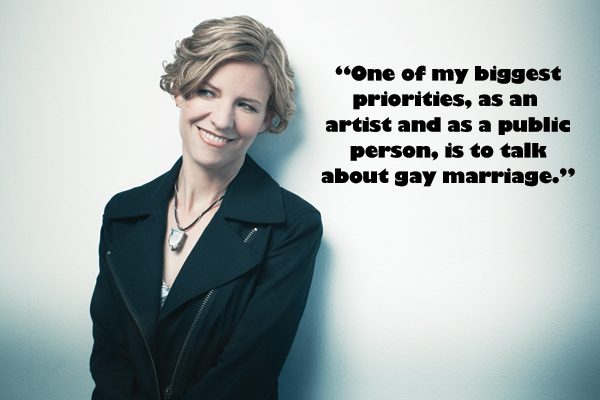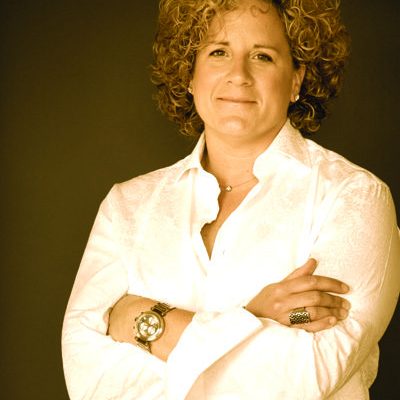
The beloved lesbian musician is back, with a little help from fans and friends.
Catie Curtis is one of those people who manages to inhabit two worlds that seem to be mutually exclusive. Not only is she an Ivy League New Englander whose songs have been featured on such mainstream TV shows as Grey’s Anatomy and Dawson’s Creek; who has performed at the White House; and who is married with two kids—but, she is also an out lesbian and a political activist; her spouse happens to be a woman; and her two daughters, Lucy and Celia, are Asian adoptees. Admirably, Curtis has never chosen one word over the other. If anything, she’s got one foot planted in each—yet, somehow, both feet get great traction.
When Curtis last released new material—2008’s Sweet Life—George W. Bush was still in office. We were heading into a recession, and gay marriage was still illegal in New York state. At the time, Curtis said that the worse things got in the world, the happier her music was going to be; indeed, one of the best songs on Sweet Life is called “Happy.” So, how does she feel now that Bush is gone? “To be invited to the White House [as] an out lesbian—that speaks really highly of the Obama administration,” she says. “I feel like we’re in a different place than we were when Sweet Life came out. [With my new] record, I didn’t feel a need to lift up everybody’s spirits. As difficult as things are, they’re not quite as bad now.”
That new record, which was released at the end of August, is called Stretch Limousine on Fire. Despite the rock-’n’-roll-sounding title, this is singer-songwriter fare: mellow, personal and universal. It’s also concise; the 10 songs run just over half an hour.
The album’s origins, according to Curtis, are very L.A.: “I was driving to a gig in Los Angeles,” she explains. “Picture me sitting in traffic and not really looking forward to doing the schmooze thing, and, literally, I see a stretch limousine that’s on fire on the side of the highway! I thought, Wow. Everybody has bad days! As soon as I saw [the burning limousine], I started singing it.”
Stretch Limousine leads off with the beautiful “Let It Last,” on which Curtis is joined by her good friend Mary Chapin Carpenter. “Let It Last” finds Curtis meditating on life’s simple pleasures—drinking lemonade on a sunny day, visiting her parents. She sings, “They still have boxes of my stuff. / When I go there, I say I’m going home.” “It’s about how fast life goes by,” she explains. “It’s sort of like a prayer, or a pleading, to just enjoy the preciousness of life a little bit more.”

Another song on the album is titled simply “I Do” and is followed by “Wedding Band.” It’s no coincidence that the two are placed one after the other. “One of my biggest priorities, as an artist and as a public person, is to talk about gay marriage,” says Curtis. “I put those songs back-to-back because one song is about the importance of taking that leap, emotionally and legally. And then the next song, ‘Wedding Band,’ is a little more of a humorous look at the day-to-day stuff that makes your marriage a struggle. I think those things are very much related. As soon as we talk about gay marriage, inevitably there’s talk about gay divorce. We’re human.”

Curtis isn’t kidding about gay marriage is a priority to her. She and her partner were married in Massachusetts, where she’s been based for years. But that’s only part of the equation. Last year, Curtis became an ordained minister in the Unitarian Universalist Church—and since that time, she’s been officiating at same-sex marriages herself. “I feel like [my song] ‘Magnolia Street’ has been used in half of the lesbian weddings I’ve heard of,” she says with a laugh. “I’m often asked to sing at them. So at one particular wedding, I was singing at, I saw the officiant stumbling through and I thought, I can do a better job than that! So it’s been a really cool, sort of natural extension of what I’ve done over the years as a musician, to actually stand up with women and help them make that commitment to each other. I feel like I get to be part of people’s life stories in a really special way. It’s kind of like this long-term relationship that I have with the LGBT community.”
She recently officiated at a wedding where she really was part of the couple’s life story. “Back in 1999, I played a benefit concert. They got this radio host from the major pop station in Portland, Maine, to host the concert. Her name’s Lori Voornas. She had a ticket winner who didn’t show up, who was supposed to meet me. So she randomly went out in the crowd and found this very outgoing fan and said, ‘You have to pretend you’re the ticket winner, and you have to come to meet Catie Curtis.’ Well, she and that woman really connected that night. Eleven years later, they both worked a benefit concert I was doing again in Maine [and met for] the second time. And two weeks ago, I married them!”

Whether it’s through her marriages or her music, Curtis has been there for her fans. Now they are there for her. “There’s [only] so much a record company can do these days,” she acknowledges. “There’s a small group [of fans] who have become part of my inner circle and helped to make this new CD possible. One of them is a Harvard Business School professor. One does media relations for a Fortune 100 company. One of them owns a really well-known graphic arts company. These women have come into my professional life and have joined forces to help me forge ahead in the music business.”
“I didn’t go to business school or anything,” adds Curtis (who did attend Brown University). And she was not too proud to accept help when it came to producing her eagerly awaited 11th studio album. “So it’s been really important to have folks who are very protective and supportive of me lending their assistance to keep my business vital. I feel like this is a really special group. There’s something about it that feels like something lesbians would do for each other. And as a recipient of this, it’s been really cool. It’s really different from an old boys’ network because it’s people offering to help.”
A select and dedicated group of fans—successful businesswomen who have fallen in love with her lyrics and emotionally charged music—guided Curtis in rebranding and repositioning herself and encouraged her to create her next album. Then they secured the funding to make that album a reality. It seems only fitting that after devoting 25 years to her career in music, and after standing up for her fans by officiating at lesbian weddings and commitment ceremonies, Curtis now finds that her fans are standing up for her. (catiecurtis.com)




